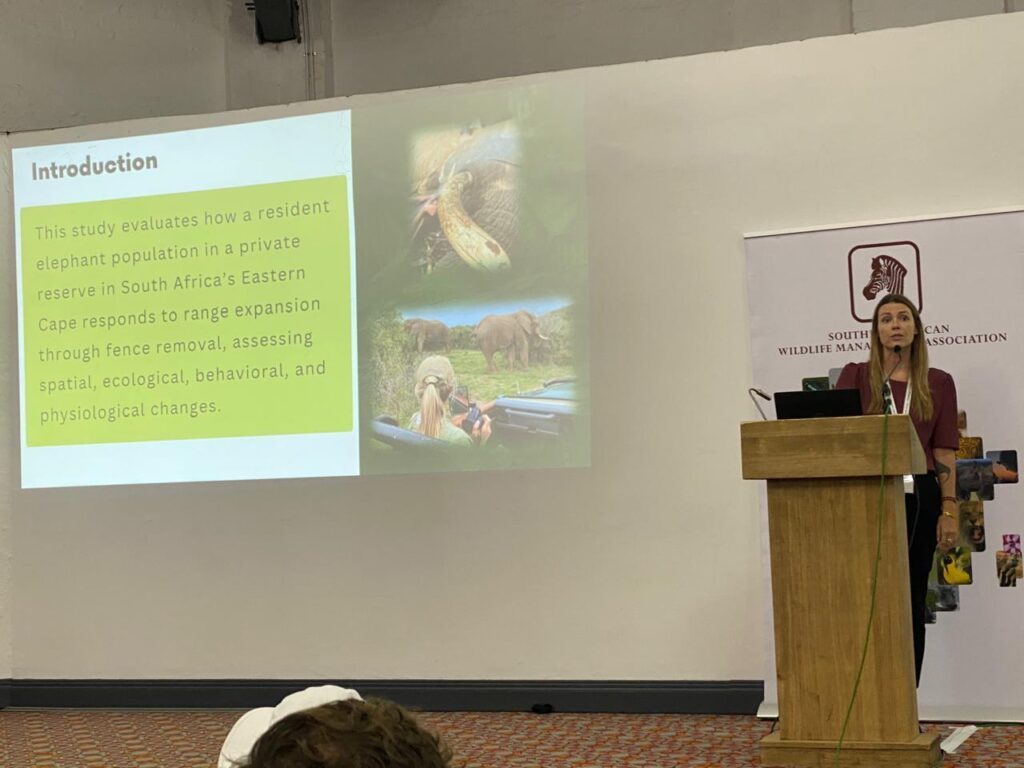From Conservation Philosophy to Range Expansion: Rethinking Elephant Conservation
September 7, 2025 The Bring The Elephant Home Africa team was proud to attend and present at this year’s Southern African Wildlife Management Association (SAWMA) conference in Port Alfred, South Africa. This gathering of researchers, practitioners, and conservation leaders provided an important platform to share new insights into how we can create a future where people and elephants thrive together.
Conservation Philosophies in Practice

Our founder, Antoinette van de Water, presented “Community Perspectives on Conservation Approaches and Philosophies in Human–Elephant Landscapes.”
Conservation is often framed in polarised terms: either protecting nature at all costs or prioritising human needs. Yet our research across South Africa, Namibia, and Thailand, with 728 participants, shows that real communities hold much more complex and pluralistic views.
Instead of aligning exclusively with one philosophy, most people support a combination of approaches:
- Protectionist Conservation concerns for species survival and wilderness,
- New Conservation focuses on human well-being and livelihoods,
- Compassionate Conservation emphasis on care for individual animals, and
- Convivial Conservation calls for justice, equity, and coexistence.
Despite our differences, we share more than we often realise. The real challenge is how we can join forces in shaping a shared future, one that may at times require compromise. Our results show that elephant conservation is not paralysed by polarisation. Instead, people already combine protection, care, and coexistence values in practice.
Our findings remind us that conservation, at its heart, is about values, and about the dignity we extend to other beings. Shared ethical floors, such as dignity, rights, and welfare, provide both a moral responsibility and a practical guide for action. Governance must then adapt to the local context, building on these foundations.
So instead of asking only about the direct consequences of management interventions, the deeper questions are: what kind of relationship do we choose to build with the living world, and what kind of conservation legacy do we want to leave for future generations? In Antoinette’s upcoming paper, the people who live closest with elephants are showing us the way.
Watch Antoinette’s presentation:
Giving Elephants Room to Roam

Our Regional Director Africa, Brooke Friswold, presented her research: “Range expansion improves elephant well-being and facilitates reciprocal ecosystem recovery: Evidence from a South African reserve.”
Her study at Kariega Game Reserve compared elephant behavior and welfare before and after an internal fence was removed. The results are striking:
- Reduced stress-related and aggressive behaviors
- Lower stress hormone levels in dung
- Recovery of overused vegetation
- Longer daily travel distances resembling wild, unfenced populations
- Richer and more natural social interactions
This research demonstrates that breaking down barriers – both philosophically and physically – improves elephant welfare and restores ecosystems, creating cascading benefits for people, wildlife, and landscapes.
Watch Brooke’s presentation:
Why It Matters
Together, these presentations underline two essentials of successful conservation:
- Philosophical inclusivity – acknowledging and integrating the diverse values of communities living with elephants.
- Ecological freedom – creating the space and conditions elephants need to live as naturally as possible.
At Bring The Elephant Home, we believe these two foundations. Listening to local people and giving elephants room to roam are the key to building just, sustainable futures for both humans and elephants.
We are proud to have contributed to SAWMA 2025 and look forward to sharing the full publications soon.
Keep an eye out for these upcoming publications!
In Africa, our work centers on elephant well-being and conservation, science-based research, governmental advocacy, and community integration. Read more.


‹ Back to previous page
